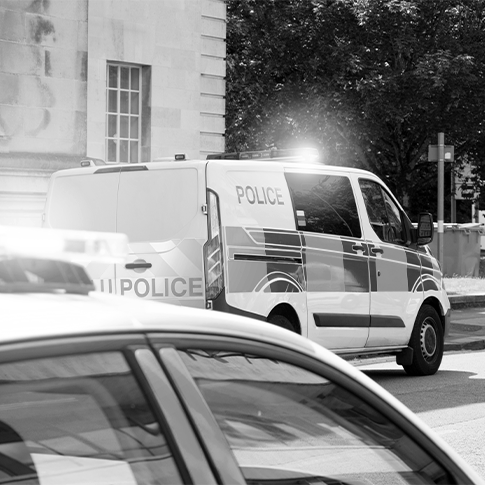Police Search and Seizure Powers | PACE 1984

In a previous article posted to this website entitled ‘Police Interviews and Questioning’, we detailed the manner in which The Police and Criminal Evidence Act 1984 (‘PACE’) provided the rules and procedure surrounding police interviews and questioning.
PACE also provides the rules and procedure governing search and seizure activities which are an essential part of police procedure in their pursuit of bringing criminals to justice.
Sukhdip Randhawa of KANGS outlines the relevant legislation.
Entry, Search and Seizure | PACE
Search and entry into a property in the UK and seizure of goods are governed by PACE at:
- Section 8 PACE - Entry and search of premises upon issue of a Warrant.
- Sections 17 & 18 PACE- Entry for purpose of arrest etc. and Entry and search after arrest, without the issue of a Warrant.
- Section 19 PACE - General power of seizure etc.
- Section 20 PACE - Extension of powers of seizure to computerised information.
A Warrant is an Order granted by a court, following Application by a law enforcement agency, providing consent for the police to enter and search a property.
Such an Application is made to a Magistrates’ Court without notice to preserve the element of surprise and prevent any activity which may defeat the purpose of such search.
The Application must show reasonable grounds for suspicion of criminal activity, such as the production and sale of drugs.
Searches for which a Warrant has been granted
Section 8 PACE states:
‘Power of justice of the peace to authorise entry and search of premises.
(1) If on an application made by a constable a justice of the peace is satisfied that there are reasonable grounds for believing—
(a) that an indictable offence has been committed; and
(b) that there is material on premises mentioned in subsection (1A) below which is likely to be of substantial value (whether by itself or together with other material) to the investigation of the offence; and
(c) that the material is likely to be relevant evidence; and
(d) that it does not consist of or include items subject to legal privilege, excluded material or special procedure material; and
(e) that any of the conditions specified in subsection (3) below applies,
he may issue a warrant authorising a constable to enter and search the premises in relation to each set of premises specified in the application.
(1A) The premises referred to in subsection (1)(b) above are—
(a) one or more sets of premises specified in the application (in which case the application is for a “specific premises warrant”); or
(b) any premises occupied or controlled by a person specified in the application, including such sets of premises as are so specified (in which case the application is for an “all premises warrant”).
(1B) If the application is for an all premises warrant, the justice of the peace must also be satisfied—
(a) that because of the particulars of the offence referred to in paragraph (a) of subsection (1) above, there are reasonable grounds for believing that it is necessary to search premises occupied or controlled by the person in question which are not specified in the application in order to find the material referred to in paragraph (b) of that subsection; and
(b) that it is not reasonably practicable to specify in the application all the premises which he occupies or controls and which might need to be searched.
(1C) The warrant may authorise entry to and search of premises on more than one occasion if, on the application, the justice of the peace is satisfied that it is necessary to authorise multiple entries in order to achieve the purpose for which he issues the warrant.
(1D) If it authorises multiple entries, the number of entries authorised may be unlimited, or limited to a maximum.
(2) A constable may seize and retain anything for which a search has been authorised under subsection
(1) above.
(3) The conditions mentioned in subsection (1)(e) above are—
(a) that it is not practicable to communicate with any person entitled to grant entry to the premises;
(b) that it is practicable to communicate with a person entitled to grant entry to the premises but it is not practicable to communicate with any person entitled to grant access to the evidence;
(c) that entry to the premises will not be granted unless a warrant is produced;
(d) that the purpose of a search may be frustrated or seriously prejudiced unless a constable arriving at the premises can secure immediate entry to them.
(4) In this Act “relevant evidence”, in relation to an offence, means anything that would be admissible in evidence at a trial for the offence.’
It is to be noted that:
- the evidence must be relevant,
- the evidence subject to a search cannot be legally privileged material or other material of that nature such as private and confidential documentation relevant to legal and/or medical matters.
- searches must be conducted within the terms of the Warrant, such as any number of searches allowed. Thereafter, a new warrant must be applied for.
Entry and Searches Without a Warrant
Section 17 PACE states:
‘Entry for purpose of arrest etc.
(1) Subject to the following provisions of this section, and without prejudice to any other enactment, a constable may enter and search any premises for the purpose—
(a) of executing—
(i) a warrant of arrest issued in connection with or arising out of criminal proceedings; or
(ii) a warrant of commitment issued under section 76 of the Magistrates’ Courts Act 1980;
(b) of arresting a person for an indictable offence;
(c) of arresting a person for an offence under—
(i) section 1 (prohibition of uniforms in connection with political objects), of the Public Order Act 1936;
(ii) any enactment contained in sections 6 to 8 or 10 of the Criminal Law Act 1977 (offences relating to entering and remaining on property);
(iii) section 4 of the Public Order Act 1986 (fear or provocation of violence);
(iiia) section 4 (driving etc. when under influence of drink or drugs) or 163 (failure to stop when required to do so by constable in uniform) of the Road Traffic Act 1988;
(iiib) section 27 of the Transport and Works Act 1992 (which relates to offences involving drink or drugs);
(iv)section 76 of the Criminal Justice and Public Order Act 1994 (failure to comply with interim possession order);
(v) any of sections 4, 5, 6(1) and (2), 7 and 8(1) and (2) of the Animal Welfare Act 2006 (offences relating to the prevention of harm to animals);
(vi) section 144 of the Legal Aid, Sentencing and Punishment of Offenders Act 2012 (squatting in a residential building);
(2) Except for the purpose specified in paragraph (e) of subsection (1) above, the powers of entry and search conferred by this section—
(a) are only exercisable if the constable has reasonable grounds for believing that the person whom he is seeking is on the premises; and
(b) are limited, in relation to premises consisting of two or more separate dwellings, to powers to enter and search—
(i) any parts of the premises which the occupiers of any dwelling comprised in the premises use in common with the occupiers of any other such dwelling; and
(ii) any such dwelling in which the constable has reasonable grounds for believing that the person whom he is seeking may be.
(3) The powers of entry and search conferred by this section are only exercisable for the purposes specified in subsection (1)(c)(ii), (iv) or (vi) above by a constable in uniform.
(4) The power of search conferred by this section is only a power to search to the extent that is reasonably required for the purpose for which the power of entry is exercised.
(5) Subject to subsection 6 below, all the rules of common law under which a constable has power to enter premises without a warrant are hereby abolished.
(6) Nothing in subsection (5) above affects any power of entry to deal with or prevent a breach of the peace.
Section 18 PACE states:
‘Entry and search after arrest.
(1) Subject to the following provisions of this section, a constable may enter and search any premises occupied or controlled by a person who is under arrest for an indictable offence, if he has reasonable grounds for suspecting that there is on the premises evidence, other than items subject to legal privilege, that relates—
(a) to that offence; or
(b) to some other indictable offence which is connected with or similar to that offence.
(3) The power to search conferred by subsection (1) above is only a power to search to the extent that is reasonably required for the purpose of discovering such evidence.
(4) Subject to subsection (5) below, the powers conferred by this section may not be exercised unless an officer of the rank of inspector or above has authorised them in writing.
(5) A constable may conduct a search under subsection (1)—
(a) before the person is taken to a police station or released under section 30A, and
(b) without obtaining an authorisation under subsection (4), if the condition in subsection (5A) is satisfied.
(5A) The condition is that the presence of the person at a place (other than a police station) is necessary for the effective investigation of the offence.
(6) If a constable conducts a search by virtue of subsection (5) above, he shall inform an officer of the rank of inspector or above that he has made the search as soon as practicable after he has made it.
(7) An officer who—
(a) authorises a search; or
(b) is informed of a search under subsection (6) above, shall make a record in writing—
(i) of the grounds for the search; and
(ii) of the nature of the evidence that was sought.
(8) If the person who was in occupation or control of the premises at the time of the search is in police detention at the time the record is to be made, the officer shall make the record as part of his custody record.’
It will be clear that sections 17 and 18 of PACE provide relatively wide powers of search both before and after arrest without a Warrant having been obtained from a Magistrates’ Court.
Additionally, law enforcement Officers have powers to seize evidence discovered when searching premises, with or without a Warrant, as follows.
Seizure of property
In addition to the powers of seizure referred to above at sections 8(2) and 18(2), PACE provides as follows.
Section 19 PACE - General power of seizure etc.
(1) The powers conferred by subsections (2), (3) and (4) below are exercisable by a constable who is lawfully on any premises.
(2) The constable may seize anything which is on the premises if he has reasonable grounds for believing—
(a) that it has been obtained in consequence of the commission of an offence; and
(b) that it is necessary to seize it in order to prevent it being concealed, lost, damaged, altered or destroyed.
(3) The constable may seize anything which is on the premises if he has reasonable grounds for believing—
(a) that it is evidence in relation to an offence which he is investigating or any other offence; and
(b) that it is necessary to seize it in order to prevent the evidence being concealed, lost, altered or destroyed.
(4) The constable may require any information which is stored in any electronic form and is accessible from the premises to be produced in a form in which it can be taken away and in which it is visible and legible or from which it can readily be produced in a visible and legible form if he has reasonable grounds for believing—
(a) that—
(i) it is evidence in relation to an offence which he is investigating or any other offence; or
(ii) it has been obtained in consequence of the commission of an offence; and
(b) that it is necessary to do so in order to prevent it being concealed, lost, tampered with or destroyed.
(5) The powers conferred by this section are in addition to any power otherwise conferred.
(6) No power of seizure conferred on a constable under any enactment (including an enactment contained in an Act passed after this Act) is to be taken to authorise the seizure of an item which the constable exercising the power has reasonable grounds for believing to be subject to legal privilege.
20 Extension of powers of seizure to computerised information.
(1) Every power of seizure which is conferred by an enactment to which this section applies on a constable who has entered premises in the exercise of a power conferred by an enactment shall be construed as including a power to require any information stored in any electronic form contained in a computer and accessible from the premises to be produced in a form in which it can be taken away and in which it is visible and legible or from which it can readily be produced in a visible and legible form.
(2) This section applies—
(a) to any enactment contained in an Act passed before this Act;
(b) to sections 8 and 18 above;
(c) to paragraph 13 of Schedule 1 to this Act; and
(d) to any enactment contained in an Act passed after this Act.’
Points of Note:
- Property can be seized for relatively undefined periods.
- Whilst many agencies will hold property for up to six months, goods are frequently retained for much for longer periods until investigations and any court proceedings are concluded.
How Can We Help You
As described above, seized property may be retained for years creating considerable inconvenience and distress.
Whilst the authorities are entitled to exercise this right, circumstance may exist whereby an experienced solicitor may well be able to assist in an attendance to inspect items or copies made even if the return of such property is not granted until police investigations or prosecution have concluded.
In addition, there is the right to challenge both the validity and the scope of a Search Warrant but there are very strict time limits which apply to such actions.
At any point throughout the search and seizure process you may well be subjected to a formal Interview, at which it is essential that you are advised and accompanied by an experienced lawyer.
The team at KANGS is experienced assisting clients at all stages of a police investigation from the initial Dawn Raid, search and arrest through to court proceedings should they be commenced.
If you need assistance contact us using the details below:
Tel: 0333 370 4333
Email: info@kangssolicitors.co.uk
We provide initial no obligation discussion at our three offices in London, Birmingham, and Manchester. Alternatively, discussions can be held through video conferencing or telephone.
Top ranked by leading legal directories Chambers UK and the Legal 500.






